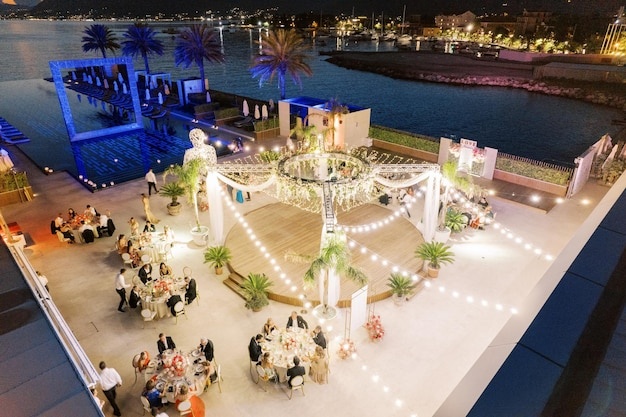If you’re new to event planning, the process can feel like juggling a thousand moving pieces. From choosing the right venue to crafting a memorable experience, each step requires careful attention to detail. Whether you’re planning a small gathering or a large-scale corporate event, mastering the basics will set you on the path to success.
We’ve gathered insights and tips from some of the best event planners in Dubai to help you start your event planning journey with confidence.
Step 1: Define Your Event’s Purpose and Goals
Every successful event begins with a clear purpose and set goals. Before diving into logistics, ask yourself these key questions:
- What is the primary objective of this event? (e.g., to educate, celebrate, network, or raise funds)
- Who is the target audience, and what will appeal to them?
- What outcomes are you hoping to achieve?
Having a well-defined purpose not only helps guide your planning but also keeps your efforts focused. For instance, if your goal is to create networking opportunities, you might prioritize seating arrangements and activities that encourage interaction. Taking time to clarify your purpose will set a strong foundation for the rest of your planning process.
Step 2: Develop a Realistic Budget
Budgeting is often one of the most challenging aspects of event planning. But with a well-prepared budget, you can avoid financial stress and make smart spending decisions. Event budgets should cover these key categories:
- Venue and Catering: The largest expenses often come from renting a venue and providing food and beverages.
- Entertainment and AV: Depending on the event, you may need to budget for speakers, DJs, musicians, or AV equipment.
- Décor and Materials: From flowers to signage, factor in costs associated with creating the event atmosphere.
- Marketing and Communication: Include expenses related to promoting the event, such as digital ads, printed materials, or email marketing tools.
- Staffing and Logistics: Account for any personnel or logistical costs, such as transportation or security.
Experienced event planners in Dubai recommend setting aside a contingency fund—typically 10-15% of your budget—to cover unforeseen expenses. By mapping out your finances, you’ll have a clear roadmap for allocating funds wisely.
Step 3: Choose the Right Venue
Selecting the right venue can make or break your event’s success. When considering venues, think about factors such as:
- Location: Choose a location that is convenient and accessible for your target audience.
- Capacity: Ensure the venue can comfortably accommodate your expected guest count.
- Amenities and Services: Check if the venue provides essential services like catering, AV equipment, and parking.
- Flexibility: Look for venues that offer flexible layouts to meet your event’s specific needs.
For beginners, it may be tempting to choose a venue based on aesthetics alone, but experienced planners recommend balancing style with functionality. Event planners in Dubai, where venues range from luxurious hotels to desert retreats, stress the importance of understanding your audience’s expectations when selecting a venue. A well-suited location can significantly enhance the overall experience for attendees.
Step 4: Plan a Timeline and Checklist
One of the secrets to a successful event is staying organized, and creating a timeline and checklist can be invaluable. Start by listing every task that needs to be completed, and assign deadlines leading up to the event day. A basic timeline might look something like this:
- 6 Months Before: Define event goals, create a budget, and secure the venue.
- 4 Months Before: Arrange catering, confirm speakers/entertainers, and send initial invites.
- 2 Months Before: Finalize décor, arrange AV needs, and launch event promotions.
- 1 Month Before: Confirm all logistics, finalize guest list, and conduct a final venue walkthrough.
- 1 Week Before: Test AV equipment, finalize seating, and complete last-minute details.
A checklist keeps you on track and reduces the likelihood of forgetting critical elements. Experienced planners advise reviewing your checklist weekly to ensure all tasks are moving forward.
Step 5: Design a Memorable Experience for Attendees
Crafting an enjoyable, memorable experience for attendees is the goal of every successful event planner. Start by designing elements that align with your event’s purpose and make an impact. Here are a few ways to create a memorable experience:
- Engage the Senses: Utilize sound, lighting, and décor to create an atmosphere that resonates with your theme. For example, a corporate event might feature minimalist décor and neutral colors, while a product launch could include bold lighting and interactive displays.
- Plan Interactive Elements: Attendees often remember events where they can actively participate. Consider adding workshops, Q&A sessions, or live entertainment to keep guests engaged.
- Offer Networking Opportunities: Especially for business or professional events, networking is a key motivator for attendance. Arrange dedicated networking spaces or activities that encourage guests to connect.
Event planners in Dubai often use innovative entertainment options like immersive experiences or unique photo opportunities to make an impression. The key is to think beyond the basics and look for creative ways to engage and delight your guests.
Step 6: Promote Your Event Effectively
A well-planned event needs attendees, which is where effective promotion comes in. Start by identifying channels that best reach your target audience. Options include:
- Social Media: Use platforms like Instagram, Facebook, and LinkedIn to generate interest and share event details.
- Email Marketing: Send invites and updates to your mailing list, and consider sending reminders as the event date approaches.
- Influencer Partnerships: Collaborate with influencers in your industry to increase visibility, especially if you’re hosting a public event.
Promoting an event can be time-consuming, but starting early and maintaining consistency can make a big difference. Many top event planners in Dubai recommend tracking engagement metrics on digital platforms to gauge interest and adjust strategies as needed.
Step 7: Conduct a Post-Event Review
Once your event has concluded, take time to assess its success. Reviewing the event’s outcomes and gathering feedback will give you valuable insights for future planning. Focus on these areas:
- Audience Feedback: Send a survey or gather feedback in person to learn what attendees enjoyed and what could be improved.
- Goal Achievement: Did you meet your initial objectives? For example, if your goal was networking, how many connections were made?
- Budget Analysis: Compare actual expenses to your budget. Were there any surprises or areas where you could have saved?
Even seasoned planners use post-event reviews to refine their skills. By taking notes and analyzing feedback, you’ll continue to improve and deliver even more successful events over time.
Final Words
Event planning can seem overwhelming, but with a clear purpose, a well-organized budget, and a creative approach to attendee experience, it’s possible to create unforgettable events—even as a beginner. Following these expert insights will set you on the path to becoming a more confident and effective event planner.
For those starting in event planners in Dubai, these steps are especially valuable in navigating a competitive market with high expectations. By following a structured process, you can turn any event into a memorable occasion and make a lasting impact on your guests. Remember, successful event planning is all about details, creativity, and staying organized. With these tips, you’ll be well-prepared to bring your vision to life.
Also read : Where to find the Best Professional Makeup Artist to get modern looks?




